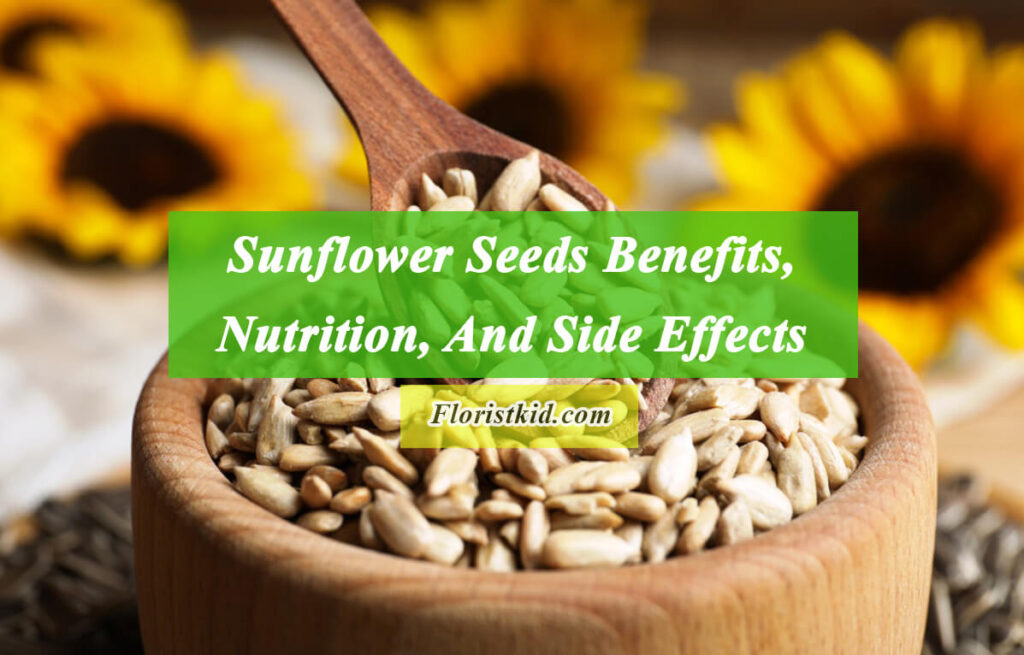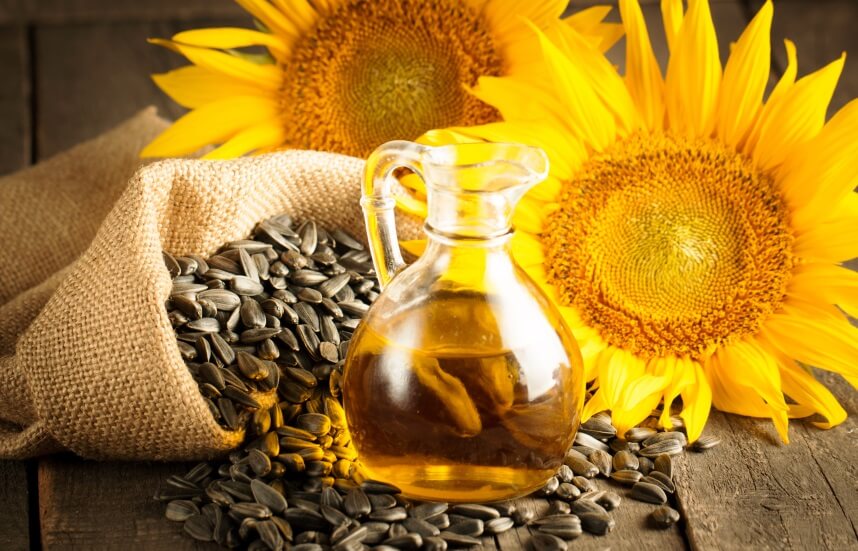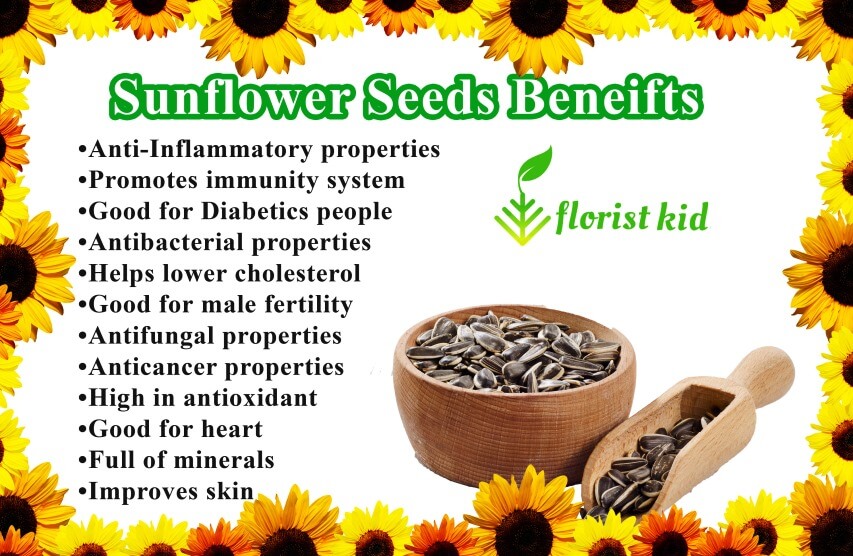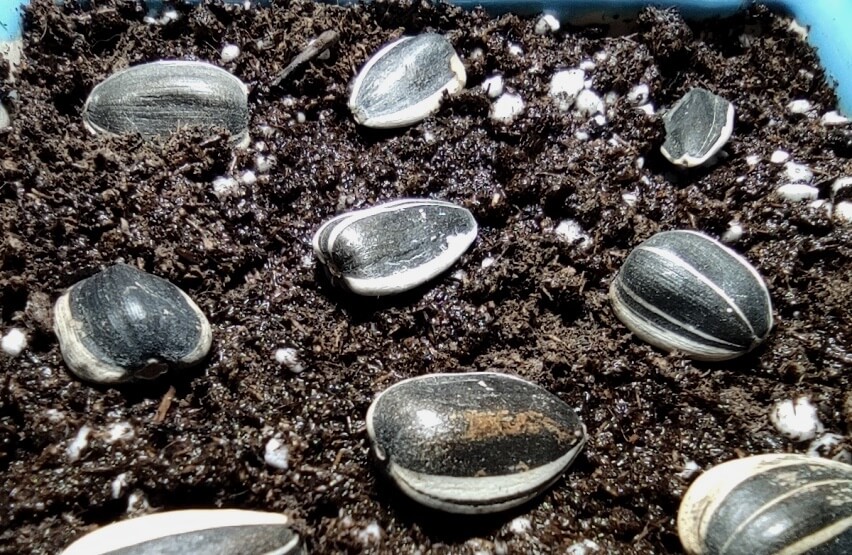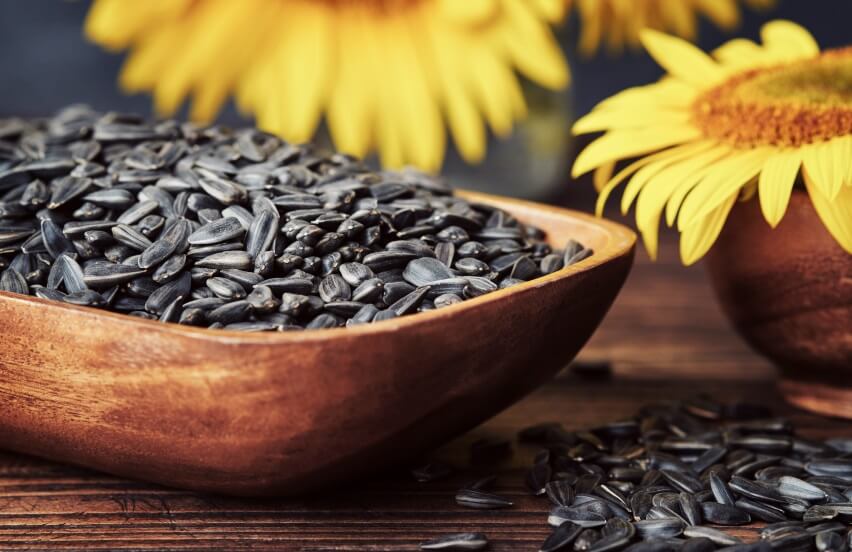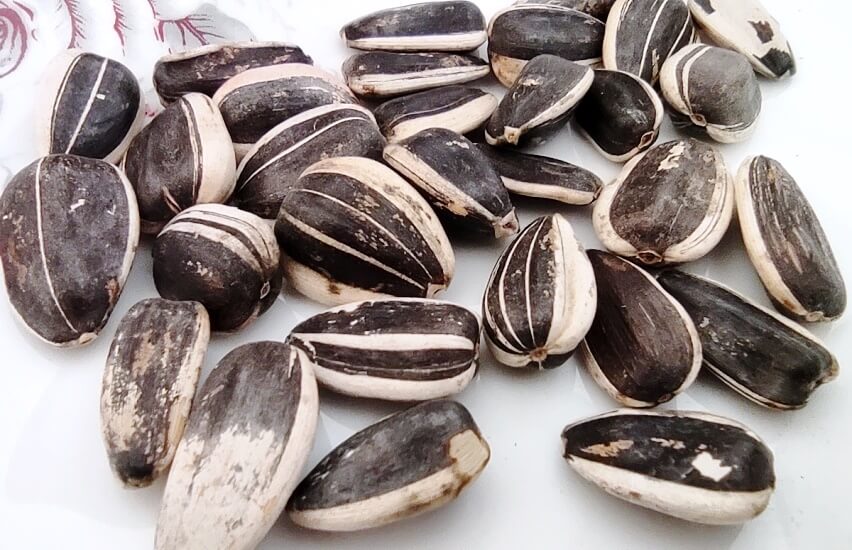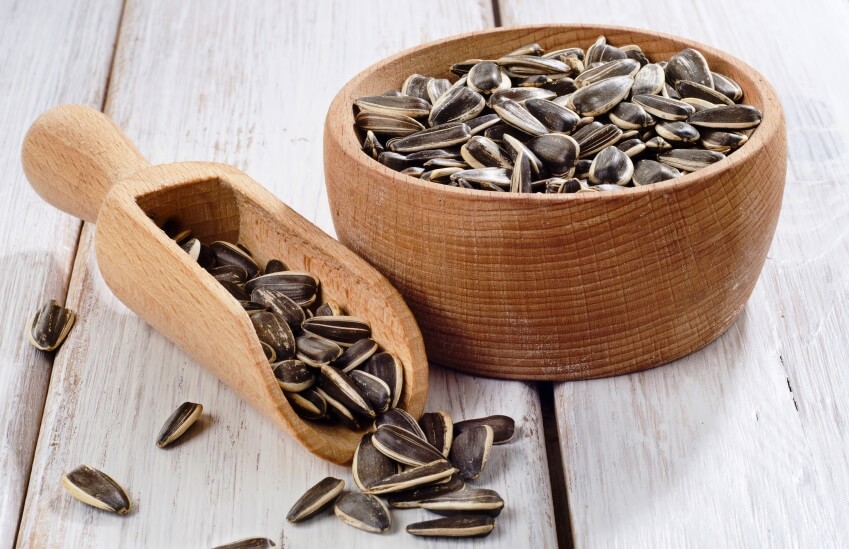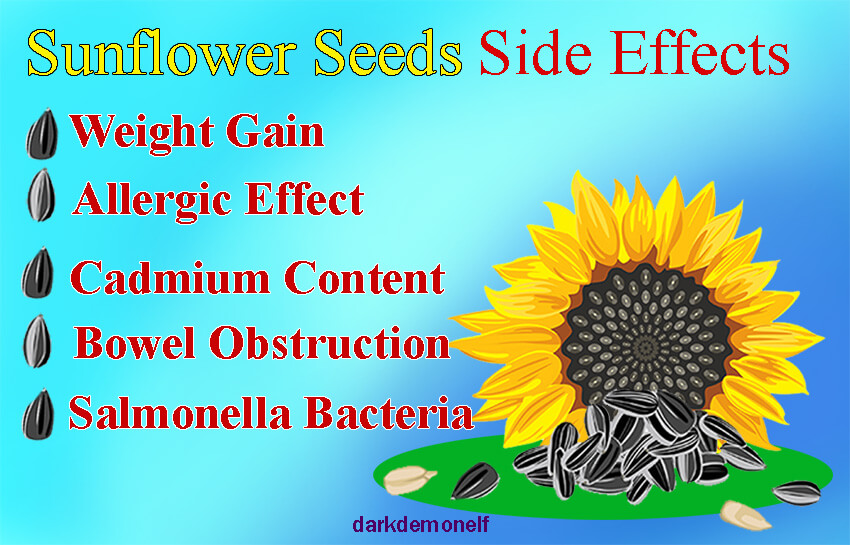Consuming sunflower (Helianthus annuus) seeds in daily life can give us a lot of the necessary amount of minerals, vitamins, proteins, and antioxidants. Sunflower seeds are a low-cost, readily accessible food that is incredibly nutritious and shows a promising role in treating infections, inflammations, malignancies, and cardiovascular diseases. Due to the significant role of sunflower seeds in our lives, this article will go through most top Sunflower seeds benefits.
If you are interested in this topic , you can also read
<<Monstera Deliciosa Fruit Benefits>> and <<Fig Leaf Beneits>>articles.
About Sunflower Seeds And Sunflower Oil
Typically, sunflower seeds are used to make sunflower oil, a very beneficial dietary supplement that is rich in fatty acids and a component of many therapeutic treatments.
Sunflower seeds can be used as a medicine to relax the blood vessels, muscles, and nerves. Sunflower seeds contain vitamin E, a vitamin that can significantly reduce inflammation and lessens rheumatoid arthritis, osteoarthritis, and asthma. These seeds are abundant in magnesium, which helps lower high blood pressure, headaches, and the risk of heart attacks.
Since sunflower seeds are diuretic and expectorant, they seeds are now prized for their ability to treat bronchial, laryngeal, and pulmonary infections as well as coughs and colds. Additionally, they are used to lessen the danger of colon cancer, diabetic problems, and the intensity of hot flashes experienced by women going through menopause.
Sunflower seed oil is applied externally as a massage oil and an oil dressing as well as orally to treat constipation. It is also used to treat skin lesions, psoriasis, and rheumatism. The sunflower oil cake is also a beneficial feed for livestock and poultry. The oil can also be used to make candles, soap, lubricants, biodiesel, and other products [1].
Sunflower Seeds Nutritional Value
The dietary and nutritional benefits of sunflower seeds are well-known. They are a wonderful source of vital minerals like vitamin E, the B-complex vitamins, selenium, copper, zinc, magnesium, folate, iron, phytochemicals, and healthy unsaturated fats, protein, and fiber. Any meals, tiffins, and snacks can be completed and complemented with sunflower seeds.
A sunflower’s seed is incredibly nutrient-dense. Following are the primary nutrients found in one ounce (30 grams or one-fourth cup) of dry-roasted, shelled sunflower seeds:
Sunflower Seeds Nutrition [2]
| Calories | 163 |
| Total fat, which includes: | 14 grams |
| • Saturated fat | 1.5 grams |
| • Polyunsaturated fat | 9.2 grams |
| • Monounsaturated fat | 2.7 grams |
| Protein | 5.5 grams |
| Carbs | 6.5 grams |
| Fiber | 3 grams |
| Vitamin E | 37% of the RDI |
| Niacin | 10% of the RDI |
| Vitamin B6 | 11% of the RDI |
| Folate | 17% of the RDI |
| Pantothenic acid | 20% of the RDI |
| Magnesium | 9% of the RDI |
| Zinc | 10% of the RDI |
| Copper | 26% of the RDI |
| Manganese | 30% of the RDI |
| Selenium | 32% of the RDI |
Sunflower Seeds Health Benefits
The comprehensive pharmacology of sunflowers has been the subject of numerous research. Some of the reported and proven Sunflower Seeds Benefits are discussed below:
Anti-bacterial Activity
Clinical investigations have emphasized the effectiveness of sunflower seeds as an antibacterial agent. According to a study conducted in Egypt, topical application of sunflower seed oil three times per day on preterm infants under 34 weeks of gestation age significantly improved skin conditions. It also significantly decreased the incidence of nosocomial infections compared to infants not receiving topical preventative treatment.
Another animal study found that Bioperoxoil (an ozonized sunflower oil) has significantly higher antibacterial activity, anti-inflammatory effects, and wound-healing capabilities compared to other commercially available antimicrobial treatments. It was also noted that the Bioperoxoil treatment had protective effects on the connective tissue of the skin and improved wound healing.
Anti-fungal Activity
Another sunflower seed health benefit is its antifungal properties. Oleozon (another ozonized sunflower oil) has been demonstrated to be a safe, effective, and affordable treatment for tinea pedis infection. Topical Oleozon and Ketoconazole Cream were compared, and no statistically significant difference was found in the clinical and mycological cure. No recurrence was seen when the patients of the Oleozon group were assessed six months after the end of the treatment [3].
In addition to having antifungal properties, sunflower has been discovered to be a valuable replacement for soybean meal and corn-steep liquor in the fermentation media used to produce antifungal antibiotics such as levorin, mycoheptin, and amphotericin. According to studies, switching from soybean meal to sunflower oil cake meal and simultaneously increasing the amount of carbohydrates in the medium boosted levorin levels by 60–70% compared to conventional media [4].
Anti-Inflammatory Activity
One of the interesting sunflower seeds benefits is their significant anti-inflammatory activity. Sunflower seeds are well known to be a great source of the body’s essential fat-soluble antioxidants, including magnesium and vitamin E. Vitamin E has antioxidant qualities that prevent free radicals from harming fat-containing molecules and structures like cholesterol, brain cells and cell membranes [5].
Sunflower seeds also contain Flavonoids and other compounds, which can help reduce inflammation. According to a study, eating five or more times per week of sunflower seeds and other seeds led to decreased levels of inflammation and, consequently, lowered risk factors for several chronic diseases.
Anti-Cholesterol Benefits
It is thought that sunflower seeds contain chemicals with a structure similar to cholesterol called phytosterols. High phytosterol dietary consumption improves human immunity and organ health, lowers cholesterol levels, and even prevents cancer. Tocopherol and phytosterol, which are present in conventional sunflower oil, have therapeutic benefits on human health by lowering levels of total plasma cholesterol and low-density lipoprotein (LDL) cholesterol [6,7].
Anti-cancer Activity
Studies have also demonstrated that sunflower seed extract has anti-diabetic and anticancer properties. Selenium is a trace mineral that is essential for maintaining excellent health in humans, and sunflower seed is a good source of this element. Data from intervention trials and studies on animal cancer models have revealed a strong inverse connection between selenium intake and cancer incidence.
Advanced cancer patients may benefit from high-dose selenium therapy in some circumstances. When used in conjunction with chemotherapy, radiation, and radical surgery for patients with advanced cancer who have developed chemo-resistance, selenium may be a tolerated drug with no major serious adverse effects [8].
Vitamin E, the main soluble antioxidant in the body, may be found in large quantities in organic sunflower seeds. A lower incidence of colon cancer has also been linked to vitamin E. According to a study, eating more sunflower and pumpkin seeds than not reduces your risk of developing postmenopausal breast cancer.
Cardiovascular Health
One of the surprising things about sunflower seeds benefits is their cardioprotective properties. In an animal investigation, sunflower seed oil [high in oleic and linoleic acid] displayed cardioprotective benefits, as evidenced by a decrease in the occurrence of life-threatening arrhythmias [9].
High blood pressure is a key risk factor for heart disease, which can result in a heart attack or stroke. Sunflower seeds include Unsaturated fatty acids, particularly linoleic acid. The human body converts linoleic acid into a hormone-like substance that inhibits the enzymes responsible for constriction of the blood vessels. As a result, it might aid in blood vessel relaxation, decreasing blood pressure. Sunflower seeds’ magnesium content also lowers blood pressure [10].
Skin Protection
In addition to the commonly used therapeutic drugs that increase relipidization and reduce inflammation, sunflower seed oil offers a treatment alternative for atopic dermatitis [11].
The sunflower plant’s seeds contain a light, non-greasy oil that is also good for the skin. It is rich in calcium, zinc, potassium, iron, phosphorus, and vitamins (A, D, and especially E). Furthermore, sunflower oil is unexpectedly nutritious for the skin thanks to its high level of important fatty acids, especially linoleic acids (the amount of linoleic acid in the skin decreases with aging and can be washed away by strong soaps, shampoos, and cleansers).
Sunflower oil has beneficial protection and healing properties for mature, sensitive, dry, damaged, or inflamed skin. It is suggested for all skin types and is widely used in skin care products to moisturize, renew, protect, and condition the skin [12].
Anti-Diabetic Properties
Evidence from many studies suggests that consuming flaxseeds and sunflower seeds can help to lessen the consequences of diabetes. The chlorogenic acid, quinic acid, caffeic acid, glycosides, and phytosterols found in these seeds give them their anti-diabetic benefits. Additionally, they have 20% of proteins, which are a source of sulfur and nitrogen. These sulfur-rich proteins are perfect for human ingestion because they support metabolic processes, including insulin synthesis and muscle cell growth [13].
Sunflower Seeds Benefits For Female
As mentioned above, Sunflower seeds can lessen the severity of hot flashes in menopausal women and the risk of colon cancer. In addition, sunflower seeds are a good source of phytosterol, which may help prevent breast cancer.
Sunflower Seeds Benefits For Male
One of the main health benefits of sunflower seeds for men is an increase in sperm count. Selenium and vitamin E are abundant in sunflower seeds. Supplemental selenium and vitamin E can enhance the quality of the sperm and have positive and protective effects, particularly on sperm motility. They are useful for treating asthenoteratospermia or asthenospermia, which are identified by semen analysis as the cause of idiopathic male infertility [14].
Sunflower Seeds Side Effects For Male And Female
Allergic Effect
Those who harvest or prepare plants to manufacture sunflower seed and sunflower oil are at risk of allergic contact dermatitis. Trichomes on the surfaces of the leaves secrete the allergens. Trichomes from dry plants that are blown by the wind might also lead to airborne contact dermatitis. The pollen is considered to be a mild allergy [15].
Sunflower seed allergies are not frequent, however, a few cases have been documented. Asthma, mouth swelling, mouth itchiness, hay fever, skin rashes, lesions, vomiting, and anaphylaxis are only a few possible reactions.
Roasted, powdered sunflower seeds or sunflower seed butter can cause allergies exactly like raw sunflower seeds. Refined sunflower oil is much less likely to have enough allergenic proteins. However, in rare instances, extremely sensitive persons have experienced reactions to minute levels of the oil’s allergens [2].
Cadmium Content
Sunflowers tend to absorb cadmium from the soil and deposit it in their seeds; they have a slightly higher cadmium concentration than most other foods. That is why You should eat them in moderation. If you are exposed to this heavy metal in high doses over an extended period, it can damage your kidneys. [16].
An adult weighing 154 pounds (70 kg) is advised to consume no more than 490 micrograms (mcg) of cadmium each week. In an academic study, the average estimated cadmium intake rose from 65 to 175 micrograms per week when participants consumed 9 ounces (255 grams) of sunflower seeds each week for a year. However, neither their blood cadmium levels nor their kidneys were harmed by this amount.
So, as long as you consume normal amounts of sunflower seeds each day, such as 1 ounce (30 grams), you shouldn’t have any problems.
Salmonella Bacteria
Occasionally, seeds may contain dangerous bacteria like Salmonella, which can flourish in the warm, moist environment of sprouting. This is especially important to consider with raw sprouted sunflower seeds since they might not have been roasted above 118°F (48°C).
Higher temperature drying of sunflower seeds aids in the eradication of dangerous germs. According to one study, the prevalence of Salmonella was dramatically reduced when partially sprouted sunflower seeds were dried at temperatures of 122°F (50°C) and higher.
Bowel Obstruction
Sunflower seed consumption in high quantities has occasionally caused fecal impaction, or bowel obstruction, in both kids and adults. You might mistakenly consume indigestible shell pieces when eating sunflower seeds. Doing so may raise your risk of fecal impaction.
Weight Gain
Sunflower seeds contain a lot of calories. Weight gain is another side effect of excessive consumption of sunflower seeds. Since these seeds are so tasty, consuming too many of them is easy while still believing they are a healthy snack. But you should remember that overuse can negate any possible advantages and create health issues.

